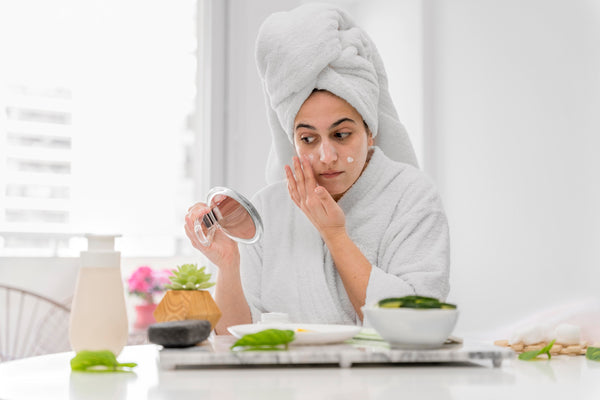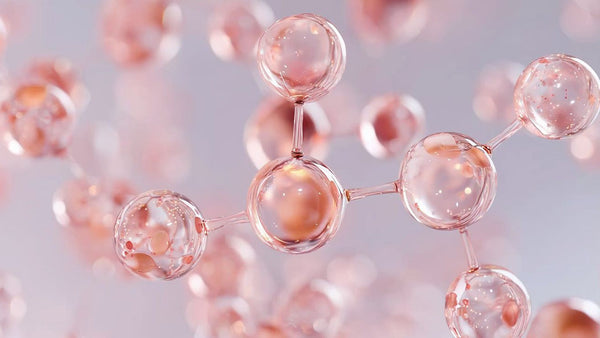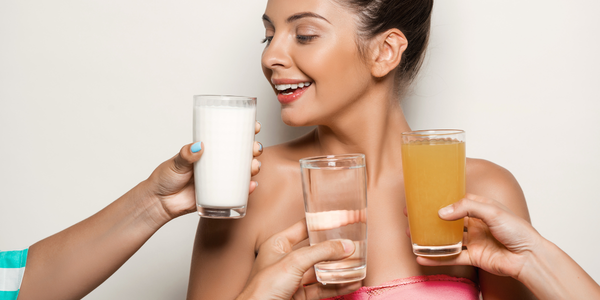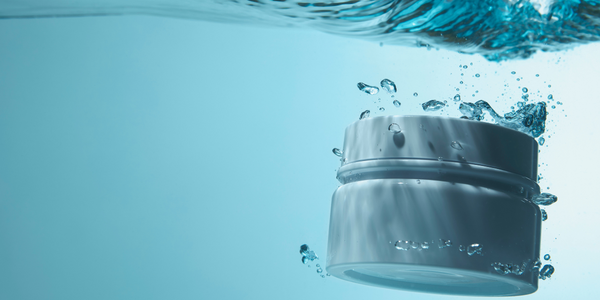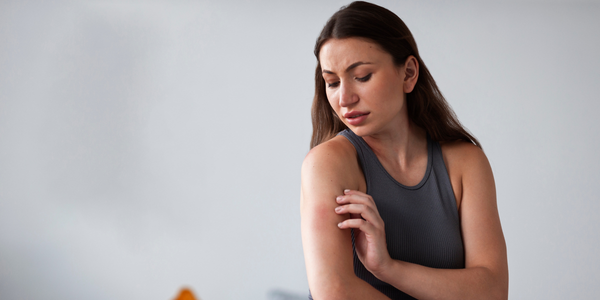As you age, your skin begins to lose its elasticity and does not remain as plump as it was when you were young. That happens because of a decrease in the production of collagen and elastin. These two components are crucial for firm and healthy-looking skin.
If you have noticed wrinkles, fine lines, or other signs of ageing on your skin, it indicates that your skin has started to lose its elasticity. Fortunately, there are still certain ways to help you refresh your skin and improve your skin's elasticity as you age. All you need is a bit of effort and dedication.
This blog will talk about how to improve skin elasticity and overall skin health without spending too much or opting for risky skin procedures. Let us first understand what skin elasticity is
What is Skin Elasticity & Why is it Important?
When you stretch your skin, and it bounces back, that skin quality is called skin elasticity. Elastin is a protein (fibrous) found in the dermal layer of the skin that is responsible for the elasticity of the skin. It helps in keeping the skin youthful, glowy, and smooth. The loss of elasticity in the skin is elastosis. That happens as you age and grow older.
The gradual loss of skin elasticity occurs when the collagen, elastin, and fat molecules present in the three layers of the skin break down. That leads to wrinkles, loose skin, skin sagging, fine lines, and more.
5 Natural Ways to Improve Skin Elasticity?
1. Manage Stress
Cortisol, the primary stress hormone, is responsible for breaking down the skin's collagen leading to early signs of ageing, wrinkles, fine lines, and sagging skin. So, it is important to minimize your stress if you want to improve skin elasticity and want your skin to be youthful for years to come. Remember, the higher the stress, the higher will be the cortisol release, and the lower will be the elastin and collagen production.
Your stress can come due to any reason. It can be physiological, emotional, or maybe related to work, or anything. Therefore, you must have a stress management plan for yourself to help keep calm. You can opt for activities like cycling, walking, running, working out, etc.
2. Sleep
Optimum hydration is one of the best ways to improve skin elasticity and keep your skin supple. Lack of adequate water intake can increase the transepidermal water loss (TEWL) and damage the skin barrier. This damage can cause premature ageing and frequent acne breakout, extreme dryness, etc.
A 2018 study mentions increased water intake can improve skin hydration levels, reduce the recurrence of dry and flaky skin and enhance elasticity. Foods with high water content like soups, coconut water, buttermilk, cucumbers, and oranges are also good sources of water for the body.
3. Stay Hydrated
Optimum hydration helps keep your skin supple. Lack of adequate water intake can increase the transepidermal water loss (TEWL) and damage the skin barrier. This damage can cause premature ageing and frequent acne breakout, extreme dryness, etc. A 2018 study mentions increased water intake can improve skin hydration levels, reduce the recurrence of dry and flaky skin and enhance elasticity. Foods with high water content like soups, coconut water, buttermilk, cucumbers, and oranges are also good sources of water for the body.
4. Add Antioxidants
Consuming sugary food can trigger gut inflammation thereby affecting skin. Skin inflammation hampers the collagen production that affects the appearance and texture of the skin. Antioxidant rich foods help reduce the oxidative damage, improve your skin health, prevent your skin from further damage and allow the damaged skin to repair itself. Incorporate Vitamins like vitamins A, C, and E, omega-3, zinc and foods like berries, oranges, lime, pecans, kale, broccoli, etc. that are high in antioxidants. Vitamin C is also known to stimulate natural collagen production helping reduce wrinkles, improve skin appearance, decrease protein fibre damage, and reduce skin roughness.
5. Skincare Supplements
Exposure to sun and pollution can also take a toll on skin quality and skin elasticity over time. Topical and skin enhancing oral supplements in these cases can be a boon to help improve skin health. Collagen Supplements help enhance elasticity, apart from improving your bone, joints, and gut health. These collagen peptides supply amino acids to the growing cells that aid the natural synthesis of fibrillin, elastin, and collagen in the body. Hyaluronic acid, popularly known as the “elixir of youth”, helps retain skin moisture content, prevents fine lines and wrinkles, and enhances overall skin complexion. You can also go for topical products with ingredients like retinol, hyaluronic acid, glutathione that benefits the skin by bringing back the lost glow.
Wrapping Up
Skin naturally loses its elasticity with time and as you age. It is a completely normal process. So instead of worrying about your ageing and losing your youthfulness, it is better to follow a healthy lifestyle, take care of your skin in the early stages, and follow the above ways to improve skin health and naturally slow down your skin ageing.
FAQs
Solano F. Metabolism and Functions of Amino Acids in the Skin. Adv Exp Med Biol. 2020;1265:187-199. doi: 10.1007/978-3-030-45328-2_11. PMID: 32761577. https://pubmed.ncbi.nlm.nih.gov/32761577/
Chen Y, Lyga J. Brain-skin connection: stress, inflammation and skin ageing. Inflamm Allergy Drug Targets. 2014;13(3):177-90. doi: 10.2174/1871528113666140522104422. PMID: 24853682; PMCID: PMC4082169. https://www.ncbi.nlm.nih.gov/pmc/articles/PMC4082169/
Oyetakin-White P, Suggs A, Koo B, Matsui MS, Yarosh D, Cooper KD, Baron ED. Does poor sleep quality affect skin ageing? Clin Exp Dermatol. 2015 Jan;40(1):17-22. doi: 10.1111/ced.12455. Epub 2014 Sep 30. PMID: 25266053. https://pubmed.ncbi.nlm.nih.gov/25266053/
Akdeniz M, Tomova-Simitchieva T, Dobos G, Blume-Peytavi U, Kottner J. Does dietary fluid intake affect skin hydration in healthy humans? A systematic literature review. Skin Res Technol. 2018 Aug;24(3):459-465. doi: 10.1111/srt.12454. Epub 2018 Feb 2. PMID: 29392767. https://pubmed.ncbi.nlm.nih.gov/29392767/
Morita A. Tobacco smoke causes premature skin ageing. J Dermatol Sci. 2007 Dec;48(3):169-75. doi: 10.1016/j.jdermsci.2007.06.015. Epub 2007 Oct 24. PMID: 17951030. https://pubmed.ncbi.nlm.nih.gov/17951030/
Bukhari SNA, Roswandi NL, Waqas M, Habib H, Hussain F, Khan S, Sohail M, Ramli NA, Thu HE, Hussain Z. Hyaluronic acid, a promising skin rejuvenating biomedicine: A review of recent updates and pre-clinical and clinical investigations on cosmetic and nutricosmetic effects. Int J Biol Macromol. 2018 Dec;120(Pt B):1682-1695. doi: 10.1016/j.ijbiomac.2018.09.188. Epub 2018 Oct 1. PMID: 30287361. https://pubmed.ncbi.nlm.nih.gov/30287361/
Schagen SK, Zampeli VA, Makrantonaki E, Zouboulis CC. Discovering the link between nutrition and skin ageing. Dermatoendocrinol. 2012 Jul 1;4(3):298-307. doi: 10.4161/derm.22876. PMID: 23467449; PMCID: PMC3583891. https://www.ncbi.nlm.nih.gov/pmc/articles/PMC3583891/














